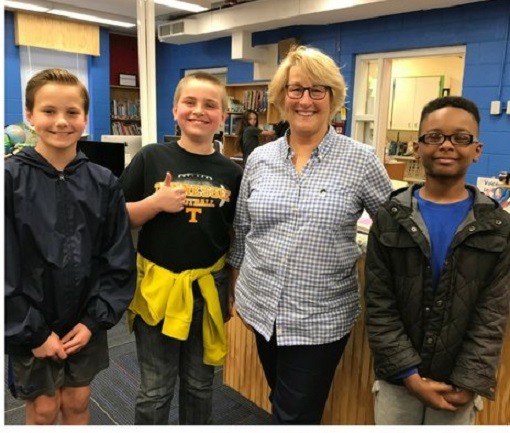The Knoxville-based Suffrage Coalition is getting ready to unveil its memorial sculpture to late legislator Harry Burn and his mother, Febb Burn, on June 9. The monument, which will be installed next to the East Tennessee History Center, at Clinch Avenue and Market Street, is a tribute to two good citizens whose actions changed America. One group of young West Knoxville citizens will be looking on with particular interest. The 2018 fifth grade class of Blue Grass Elementary pooled their money to purchase a memorial brick.
Blue Grass librarian Kerstin Sisco headed the drive. She had been immersed in the story of Tennessee’s role in ratifying the 19th amendment, which guaranteed women the right to vote. She found out that the Suffrage Coalition, headed up by attorney Wanda Sobieski, had commissioned sculptor Alan LeQuire to design the memorial. A contribution of $100 would get the donor a “forever brick,” and there were about 100 fifth graders in the class of 2018.
“Wouldn’t it be great if we had a lasting thing?” she asked herself. Students would be able to go downtown years later and point out “their” brick. She asked each one to bring one dollar. Altogether, the kids contributed $119.
“I love social studies,” Sisco says. She says the fifth grade curriculum can be quite daunting, with dozens of dates and personalities that the students are expected to memorize. By taking a personal interest in the memorial, she got the children as excited as she is about history.
The story of legislator Harry Burn and his deciding vote on women’s suffrage is detailed in Elaine Weiss’ book “The Woman’s Hour.” (Weiss was in town for a reading last March and will return for a speech at the East Tennessee History Center June 8.) In August 1920, Tennessee was set to vote on ratification of the 19th amendment. If the legislature voted yes, Tennessee would be the 36th state to do so, and women would have the right to vote. Opinion was bitterly divided, and the Tennessee legislature was deadlocked on a resolution to table the vote.
Harry Burn, a 24-year-old from Niota, the youngest man in the legislature, preferred that the vote be tabled, because tempers were running so high. It wasn’t, and he had to make public his decision. Everyone expected him to vote against it, as he was wearing a red rose in his lapel favored by the “anti” crowd. Instead, he pulled a letter out of his pocket from his mother, a college-educated farm widow, asking him to “be a good boy” and vote for ratification. He did.
Sisco read the letter with her students.
“They were interested that he was 24 years old and Mama was still writing him letters,” she says. She and her fifth graders were enthralled with the many primary sources she found related to the story, which include the telegrams Harry Burn sent later, explaining to the press that it was his own conscience along with “a mother’s advice” that made him vote yes.
“You look at things differently when you can see things as they existed at the time,” Sisco says.
Sisco says that when she attended Weiss’ reading in March, at a Friends of the Knox County Library event, a woman in the question and answer session said, “Raise your hand if you were raised in Tennessee and have never heard this story.” The audience was a sea of hands.
“It got forgotten, somehow,” Sisco says. “It’s one of the greatest stories in Tennessee.”
This group of fifth graders won’t forget Harry Burn and his mother.
“This one thing they’re going to remember, because they delved so deeply into it.”

